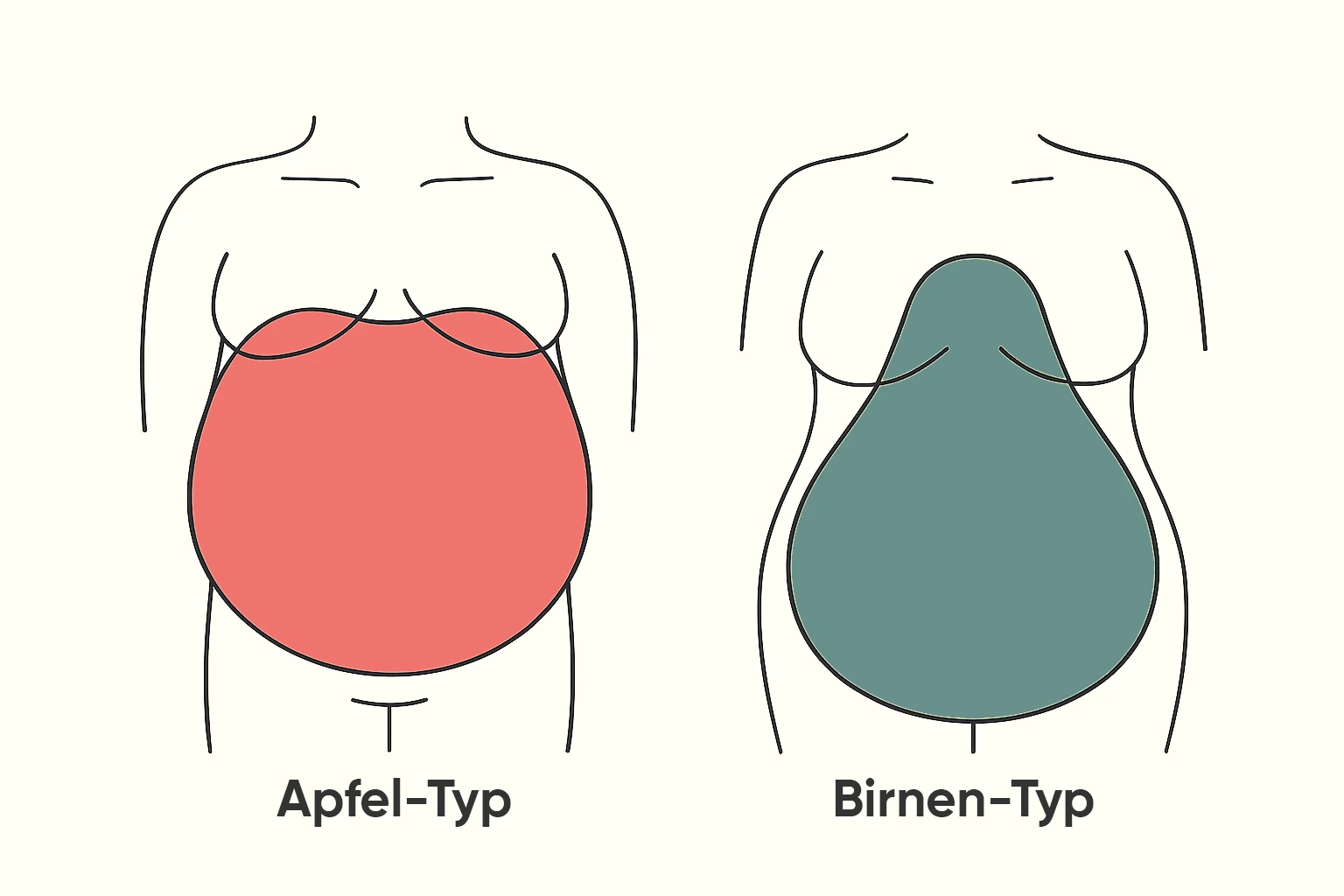
Mit Abnehmspritzen zu Deinem Wohlfühlgewicht

und starte Deine Reise mit GoLighter – ohne Hungergefühl und Kalorienzählen.
Kein Code nötig. Dein Rabatt wurde bereits automatisch angewendet.


und starte Deine Reise mit GoLighter – ohne Hungergefühl und Kalorienzählen.
Kein Code nötig. Dein Rabatt wurde bereits automatisch angewendet.
Wissenswertes und Tipps zum Abnehmen an den Oberschenkeln

Die Oberschenkel gehören bei vielen Menschen zu den Zonen, wo schnell fett ansetzt – selbst bei nur leichtem Übergewicht. Cellulite, Reiterhosen oder schlaffes Gewebe sind häufige Erscheinungen, welche jedoch nicht nur mit einem vermehrtem Fettgewebe zu erklären sind, sondern auch durch genetisch veranlagte Bindegewebsschwäche, die bei Frauen häufig vorkommt und normal ist. Einige Marketingversprechen suggerieren, dass Du Fettgewebe an den Beinen mit gezielten Übungen verlieren kannst. Das funktioniert jedoch nicht ganz so einfach. Es gibt aber Methoden, mit denen Du Dein Körperfett gesund reduzieren und dadurch an den Oberschenkeln abnehmen kannst. Welche Strategien funktionieren und worauf Du beim Gewichtsverlust achten solltest, erfährst Du hier.


Folgende Faktoren tragen besonders dazu bei, dass wir an den Oberschenkeln vermehrt Fettgewebe ansetzen:

Zwar wird immer wieder damit geworben, dass bestimmte Trainings- oder Ernährungsprogramme gezielt die Beine ansprechen, aber: Es ist nicht möglich, ausschließlich an bestimmten Körperregionen Gewicht zu verlieren. Es gibt Menschen, die Fett an den Beinen schneller abbauen als andere, das kann man nicht beeinflussen. Der Grund ist aber immer eine allgemeine Gewichtsabnahme.
Der wichtigste Faktor zum Abnehmen an Oberschenkeln ist also ein Kaloriendefizit. Das heißt, Du musst pro Tag weniger Kalorien mit der Nahrung aufnehmen, als Dein Körper verbraucht. Studien zeigen, dass der Gewichtsverlust hauptsächlich durch dieses Defizit bewirkt wird.6 Eine negative Energiebilanz von etwa 500 Kalorien täglich kann einen Gewichtsverlust von einem halben Kilo pro Woche bewirken.7
Aber um den Erfolg langfristig zu erhalten, ist eine dauerhafte Änderung des Lebensstils entscheidend. Das bedeutet, nicht nur vorübergehend weniger Kalorien zu essen, sondern gesündere Essgewohnheiten zu entwickeln und regelmäßige Bewegung zu integrieren.
Willst Du am Oberschenkel abnehmen, solltest Du zwar eine kalorienreduzierte Ernährung befolgen. Achte aber darauf, dass Du auf gesunde Weise Dein Körpergewicht reduzierst und eine ausgewogene Ernährung befolgst, die langfristig umsetzbar ist und Deinen Körper optimal versorgt.
Hier sind einige Tipps, die Dir helfen können:
Crash-Diäten oder totale Fastenkuren versprechen zwar einfaches Abnehmen an den Oberschenkeln, bieten aber keinen nachhaltigen Erfolg. Meist kehren die verlorenen Kilos schnell zurück – oft sogar mit zusätzlichen Pfunden. Der Grund: Eine kalorienarme Ernährung bewirkt verschiedene Veränderungen im Körper, die eine erneute Gewichtszunahme wahrscheinlich machen. So können hormonelle Veränderungen zum Beispiel ein stärkeres Hungergefühl hervorrufen. Hinzu kommt, dass ein niedrigeres Gewicht den Grundumsatz des Körpers reduzieren kann.
Ein ausgewogener Trainingsplan kombiniert Kraft- und Ausdauereinheiten. Cardio-Training wie Joggen, Radfahren oder Schwimmen hilft, zusätzliche Kalorien zu verbrennen und so ein Kaloriendefizit leichter zu erreichen. Krafttraining fördert den Muskelaufbau, was langfristig den Energieverbrauch leicht erhöht und zur Körperdefinition beiträgt. Gezieltes Training stärkt die Beinmuskulatur, aber für schlankere Beine ist ein insgesamt niedrigerer Körperfettanteil entscheidend. Es gibt kein gezieltes Fettabbau-Training für bestimmte Körperstellen.
Wenn Du nach längerer Pause wieder mit Sport beginnst, steigere Dich langsam, um Verletzungen zu vermeiden. Mit Dehnen, Aufwärmen, ausreichend Flüssigkeit und Erholung reduzierst Du das Risiko für Sportverletzungen.1
Neben Sport und Ernährung stehen medikamentöse Behandlungen zur Verfügung, um den Gewichtsverlust zu unterstützen. Laut der offiziellen Richtlinien kommt die Anwendung von Medikamenten infrage, wenn die betreffende Person …
Zu den bekanntesten Wirkstoffen gehören Semaglutid, Liraglutid und Tirzepatid. Semaglutid und Liraglutid sind GLP-1-Rezeptor-Agonisten, während Tirzepatid zusätzlich den GIP-Rezeptor aktiviert. Diese Rezeptoren spielen eine wichtige Rolle bei der Steuerung des Hungergefühls. Klinische Studien zeigen, dass solche Wirkstoffe den Appetit reduzieren und so den Gewichtsverlust unterstützen können.16
Abnehmmedikamente sind nur mit einer ärztlichen Verschreibung erhältlich und müssen immer mit einer Ernährungs- und Bewegungstherapie kombiniert werden. Zudem ist eine Begleitung der Behandlung durch einen Arzt / eine Ärztin notwendig, um Nutzen und Risiken individuell abzuwägen. Ein individuelles Abstimmen der Therapie ist essenziell, um Gesundheitsrisiken zu vermeiden und Nebenwirkungen zu reduzieren.
Die Fettverteilung an den Oberschenkeln wird durch Genetik, Hormone, Alter und Lebensstil beeinflusst. Besonders Frauen speichern durch Östrogene vermehrt Fett in diesem Bereich. Eine gezielte Fettverbrennung nur an den Beinen ist nicht möglich – stattdessen ist eine allgemeine Gewichtsabnahme entscheidend. Für einen nachhaltigen Erfolg ist außerdem eine langfristige Umstellung der Ernährung und Bewegung wichtig.
Effektive Methoden:

Es ist nicht möglich, ausschließlich an den Oberschenkeln abzunehmen. Eine allgemeine Gewichtsabnahme von einem halben Kilo pro Woche ist durch eine negative Energiebilanz von etwa 500 Kalorien täglich möglich.
Nein. Zwar kannst Du die Oberschenkelmuskulatur gezielt stärken, Abnehmen an den Oberschenkeln ist aber nur durch einen gesamten Gewichtsverlust möglich.
Um abzunehmen, musst Du Deine Ernährung anpassen. Pro Tag solltest Du weniger Kalorien aufnehmen, als Du verbrennst. Nur bei einer negativen Kalorienbilanz holt sich der Körper Energie aus den Fettreserven. Eine langfristige, ausgewogene und gesunde Ernährung unterstützt Deinen Abnehmerfolg.
Sport kann helfen, ein Kaloriendefizit aufrechtzuerhalten. Durch den Aufbau von Muskulatur kannst Du Deine Oberschenkel kräftigen. Regelmäßige Bewegung ist ein wichtiger Teil eines gesunden Lebensstils
Hier sind einige Tipps, die Dir im Alltag bei der Ernährungsumstellung helfen können:
Du kannst Saxenda® bestellen, wenn dir ein Arzt ein gültiges Rezept ausgestellt hat. Danach ist die Bestellung über eine zertifizierte Versandapotheke möglich.
Nein, Wegovy® kaufen ohne Rezept ist nicht möglich. Das Medikament ist verschreibungspflichtig und kann nur mit einer ärztlichen Verordnung in der Apotheke erworben werden.
1. Schleinitz, D., Böttcher, Y., Blüher, M., & Kovacs, P. (2014). The genetics of fat distribution. Diabetologia, 57(7), 1276–1286. https://doi.org/10.1007/s00125-014-3214-z
2. Lizcano, F. (2022). Roles of estrogens, estrogen-like compounds, and endocrine disruptors in adipocytes. Frontiers in Endocrinology, 13, 921504. https://doi.org/10.3389/fendo.2022.921504
3. Björntorp, P. (1997). Hormonal control of regional fat distribution. Human Reproduction (Oxford, England), 12 Suppl 1, 21–25. https://doi.org/10.1093/humrep/12.suppl_1.21
4. Wake Forest Baptist Medical Center. (2013, Februar 18). Thigh fat may be to blame for older adults who slow down. Science Daily. https://www.sciencedaily.com/releases/2013/02/130218173217.htm
5. Lipödem ». (o. J.). Frauenaerzte-im-netz.de. Abgerufen 12. März 2025, von https://www.frauenaerzte-im-netz.de/erkrankungen/lipoedem/
6. Strasser, B., Spreitzer, A., & Haber, P. (2007). Fat loss depends on energy deficit only, independently of the method for weight loss. Annals of Nutrition & Metabolism, 51(5), 428–432. https://doi.org/10.1159/000111162
7. Fletcher, J. (2020, December 23). Calorie deficit for weight loss: How it works, tips, and safety. Medicalnewstoday.com. https://www.medicalnewstoday.com/articles/calorie-deficit
8. Moon, J., & Koh, G. (2020). Clinical evidence and mechanisms of high-protein diet-induced weight loss. Journal of Obesity & Metabolic Syndrome, 29(3), 166–173. https://doi.org/10.7570/jomes20028
9. Radulian, G., Rusu, E., Dragomir, A., & Posea, M. (2009). Metabolic effects of low glycaemic index diets. Nutrition Journal, 8(1), 5. https://doi.org/10.1186/1475-2891-8-5
10. Healthy diet. (o. J.). Who.int. Abgerufen 12. März 2025, von https://www.who.int/news-room/fact-sheets/detail/healthy-diet
11. Liu, X., Li, Y., Tobias, D. K., Wang, D. D., Manson, J. E., Willett, W. C., & Hu, F. B. (2018). Changes in types of dietary fats influence long-term weight change in US women and men. The Journal of Nutrition, 148(11), 1821–1829. https://doi.org/10.1093/jn/nxy183
12. NewsWire, H. R. (2020, Januar 15). Yes, drinking more water may help you lose weight. The Hub. https://hub.jhu.edu/at-work/2020/01/15/focus-on-wellness-drinking-more-water/
13. Gu, C., Brereton, N., Schweitzer, A., Cotter, M., Duan, D., Børsheim, E., Wolfe, R. R., Pham, L. V., Polotsky, V. Y., & Jun, J. C. (2020). Metabolic effects of late dinner in healthy volunteers-A randomized crossover clinical trial. The Journal of Clinical Endocrinology and Metabolism, 105(8), 2789–2802. https://doi.org/10.1210/clinem/dgaa354
14. (O. J.). Hopkinsmedicine.org. Abgerufen 13. März 2025, von https://www.hopkinsmedicine.org/health/conditions-and-diseases/sports-injuries/preventing-sports-injuries
15. Tchang, B. G., Aras, M., Kumar, R. B., & Aronne, L. J. (2000). Pharmacologic treatment of overweight and obesity in adults. In Endotext. MDText.com, Inc.
16. Wang, J.-Y., Wang, Q.-W., Yang, X.-Y., Yang, W., Li, D.-R., Jin, J.-Y., Zhang, H.-C., & Zhang, X.-F. (2023). GLP-1 receptor agonists for the treatment of obesity: Role as a promising approach. Frontiers in Endocrinology, 14, 1085799. https://doi.org/10.3389/fendo.2023.1085799
17. Clifton, P. M. (2018). Relationship between changes in fat and lean depots following weight loss and changes in cardiovascular disease risk markers. Journal of the American Heart Association, 7(8). https://doi.org/10.1161/JAHA.118.008675